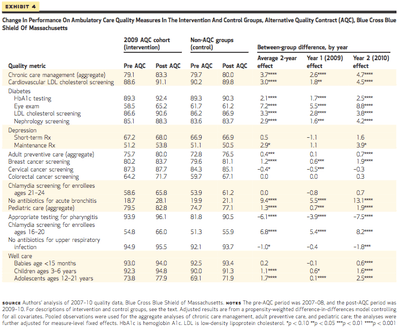Advertisement
Before You Claim Global Payments Are Improving Care...
Everyone's fretting about the cost of medical care, and whether changes in health care delivery and payment systems will save money. But what about the more intimate aspects of medicine? What about the actual care?
WBUR's Martha Bebinger offers her thoughts:
A Health Affairs report out last week concludes that a relatively new global budget contract in use by Blue Cross Blue Shield of Massachusetts has "improved care." Hold on. If this is the threshold for success, then the move to global budgets is going to disappoint a lot of regular, non-medical people, like me.
Take a closer look at the evidence of "improved care" in the report. There are two charts (and summaries, both are below). The first includes scores for 21 ways to measure whether patients received recommended preventive or maintenance care. The second looks at whether patients with diabetes, hypertension and cardiovascular disease are more likely to have their ailments under control with care through a global budget than through fee for service. Yes, there is some evidence that patients are receiving better preventive care.
But to me, "improved care" should mean more: Are patients in a global budget healthier, happier and more productive than those who receive are through traditional fee for service? I understand that measuring "health" is really hard. One quality guru told me that the U.S. has not expanded ways to measure health care quality since we started using HEDIS in, was it the early '90s? OK, but if you can't tell me I will be healthier under a global payment, then don't make the claim.
Here are some examples of things I want to know when comparing patients in and outside a global budget:
1) Do your kids with asthma miss fewer days of school?
2) Do adults diagnosed with depression miss less work?
3) Are patients readmitted to the hospital for the same or a similar ailment less frequently?
4) Do patients develop fewer hospital acquired infections?
5) Do moms suffer fewer complications after a normal vaginal delivery?
I don't want to minimize the importance of helping diabetics keep their blood sugar under control. This is important. But I need more clear, understandable proof of "improved care." Is it out there?
Here's the chart on the 21 preventive and maintenance measures:
On the chart that looks at chronic disease management control, here's what the report says:
Formal evaluation of outcome quality measures could not be conducted because of the lack of pre-intervention enrollee-level outcome data. However, an unadjusted analysis of weighted averages for five outcome metrics across provider organizations suggests that intervention groups achieved better or comparable outcomes in 2009–10 relative to recent Blue Cross Blue Shield of Massachusetts network averages.

